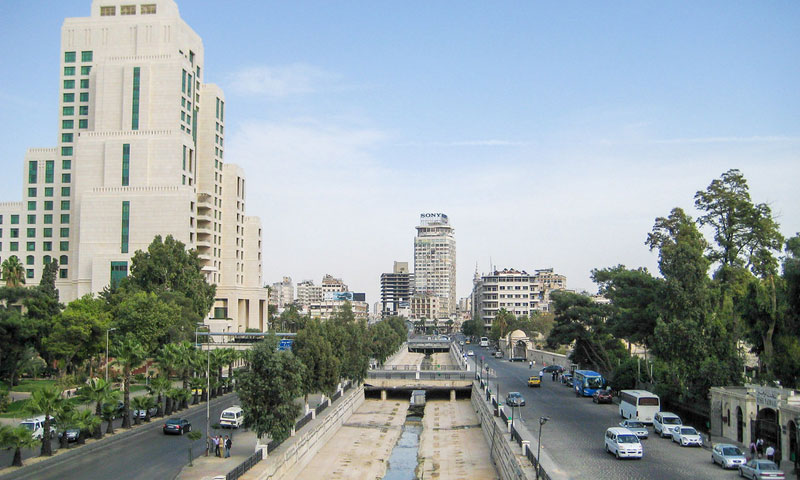



A young girl huffing Shaalah brand of glue ends up unable to move, floating in the river of Barada which passes through the abandoned Damascus International Fairgrounds to the outskirts of the city, and under the most famous bridge in the capital, where pedestrians crowd to get a seat on a bus, and where soldiers on their off-hours seek temporary lovers.
Behind this scene, captures by a journalist seeking to document child addiction last March, stands the Four Seasons Hotel in Damascus with its smooth white stone. Guests of this hotel are the few diplomats who frequent Syria, as well as artists crossing the Lebanese-Syrian border to hold concerts or be involved in television dramas looking for fresh faces.
While the per capita income in Syria is $479 per year, according to UN estimates for 2018, hotel guests pay more than $1,300 to spend one night in a double room, according to AlBooked Hotel Reservations. This is even after the original Four Seasons company withdrew its name from the hotel in Damascus.
On June 19, the Four Seasons Hotel chain announced the withdrawal of its service in Damascus after sanctions were imposed on its owner, Samer Foz, a businessman close to Bashar al-Assad.
Since its opening in 2006, the Four Seasons has been a symbol of the luxurious life of a small segment of Syrians, and the cultural landmark that symbolizes Syria’s transition under its then-new president Bashar al-Assad to a period of opening up to foreign investment, which were not available under his father’s rule.
The hotel was linked to Bashar al-Assad’s name even before he took power in Syria. The details of its establishment were agreed upon during a visit in March 2000, three months before the death of Hafez al-Assad, during which the chairman of the board for Kingdom Holding Company, Saudi businessman Al-Waleed bin Talal, met with Bashar al-Assad.
After its formal inauguration ceremony which joined Bashar al-Assad and Walid bin Talal, the hotel was made into one of the most important tourist promotion landscapes for Damascus, and its image became parallel to Mount Qasioun and the Umayyad Square as symbols of Damascus.
Soon after, in 2008, a Rotana Café was attached to the Four Seasons Hotel, linked to the Rotana franchise owned by al-Waleed bin Talal. The brand was an effort to attract artists from around the Arab world, and form a new artistic center parallel to Cairo and Beirut.
During the post-revolution period, the hotel continued to achieve fame at the level of the Arab world, while Assad’s popularity was increasing. In 2009, Four Seasons Damascus won an award as Syria’s best hotel at the World Travel Awards in Dubai. In the same year, Assad won the title of the most popular president among Arab nations, according to a survey conducted by the University of Maryland in the United States of America.
Upon the eruption of the Syrian Revolution, Syria’s tourism revenues collapsed at an estimated rate of 98%, according to a report on the American website Monitor in 2015.
Moreover, losses in the tourism sector since 2011 are estimated at $50 billion, according to estimates issued by the Ministry of Tourism last March. However, the work of the Four Seasons did not significantly diminish, as it was adopted by the United Nations mission “for security reasons” and for purposes of lodging instead of the Sheraton Hotel Damascus since 2013, and it became the site of most meetings with Syrian regime officials.
The Four Seasons hosted the Organisation for the Prohibition of Chemical Weapons inspectors following the massacre of 1,127 people in the eastern Ghouta in the summer of 2013. The hotel also witnessed deals to fund organizations linked to Assad’s wife, according to a Bloomberg report in July 2017.
While the report did not call for shifts in the United Nations financial policy towards organizations linked to the regime, more controversy was raised again in June of this year. It followed a tweet by US Congressman Joe Wilson which estimated UN spending in the Four Seasons at $26,000 per day, and ten million dollars per year.
With the rise of Syrian businessman Samer Foz, known to be a close affiliate of the regime, and following the crisis that saw to al-Waleed bin Talal’s loss of more than $15 billion due to his detention for nearly a year in Saudi Arabia, according to estimates by Bloomberg, Tala’s shares of the Four Seasons went to Foz in a deal revealed by the British newspaper Financial Times in March of last year.
The real estate value of Four Seasons declined after that deal. In April 2014, the hotel management issued a decision to close the luxury shops in its surroundings, as well as the cafe complex.
Last February, the hotel’s management began changing the Boulevard Complex, which houses 12 restaurants and seven clothing shops around the hotel selling the world’s most famous expensive brands, with luxury jewelry and watches and a private bank building.
With Foz gaining the largest share of the hotel, and its return to the business circle close to Assad, the Damascus Four Seasons became a target of sanctions against the Syrian regime.
Last June, Foz was awarded the title of Syrian oligarch by the US Treasury Department, which imposed economic sanctions on him, along with 15 individuals and entities close to the Syrian regime’s president.
After being launched under Assad’s approval and sponsoring, the Four Seasons was again relegated to Assad and its global brand name was taken away, in a move that could lead to a decline in its revenues. The fate of the hotel, as that of Syria, will be determined by UN decisions that are yet to be made.
if you think the article contain wrong information or you have additional details Send Correction